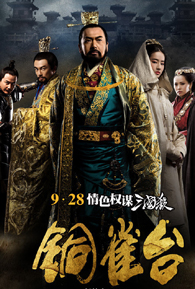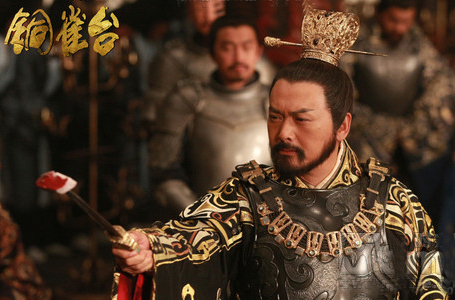
Here, the creators of The Assassins take this line of thinking to one of its logical ends: that without a warlord, strongman, and usurper like Cao Cao, China would have fallen into chaos and its people would have to endure a far longer Interregnum with more poverty, starvation, and bloodshed than what actually transpired historically. Having a pair of specially-trained, star-crossed assassins (she's the new plaything/concubine for Cao Cao, he's a newly-created court eunuch) learn this truth on their assignment to remove him though makes this project far too similar to Zhang Yimou's Hero, which also ended on a similarly conservative note. To top it off, action setpieces and mise en scene here are derivative of Yimou's work in general, with its wirework and rappelling ninja assassins, and the colour-coded palace coup from Curse of the Golden Flower.
The strongest point of The Assassins thankfully lies in its political intrigue. While Chow Yun Fatt's Cao Cao is more or less an average, shell-shocked war veteran laden with too many honours and feared and distrusted because of it (much like say Patton), he comes very close to being upstaged whenever Alec Su's puppet emperor appears on screen. In contrast to the upper class twit or ineffectual and unsuspecting fool in other ROTK-themed films, Su's Emperor Bian is a Chinese opera buff genre savvy enough to fool an entire court and several generals into backing not one but two self-coups against his most powerful duke, Cao Cao, to save what appears to be an ineffectual, unsuspecting fool of an emperor. Well... either that or he's genre savvy enough to make a show of powerlessness to gain support but not genre savvy enough to outmanoeuvre the Machiavellian politician. I'm still waiting for the Chinese to make a film which suggests both the emperor and Cao Cao were in cahoots with each other to remove the schemers who were imperilling the process of state re‑consolidation with their plots.
While the love story about the assassins is trite, the moral about a peaceful dictatorship being preferable to an anarchy too pat, it is the political intrigue in The Assassins and its deconstruction of orthodox historiography of the main actors in China's Three Kingdoms period.












 Printable Version
Printable Version

















Reader's Comments
Be the first to leave a comment on this page!
Please log in to use this feature.